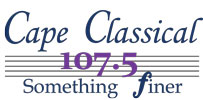The Cape Symphony Orchestra presents “Beethoven: The Revolutionary” Saturday, April 5, 2025 at 7:30 PM and Sunday, April 6, 2025 at 3:00 PM at the Barnstable Performing Arts Center.
This season’s Masterpiece Series concerts are a vital component of the search for Cape Symphony’s next Music Director. Each will be conducted by a candidate for the position. Ticketholders will have the opportunity to share their thoughts in a survey to be emailed the week after the performance. We hope you'll weigh in!
Download a printable version of these Show Notes.
Cape Symphony
Dina Gilbert, Guest Conductor
Cape Symphony Orchestra Musicians
Guest Artist
Alexi Kenney, Violin
Table of Contents
Tickets for “Passport to Rome”
Program
LUDWIG VAN BEETHOVEN (1770-1827)
Leonore Overture No. 3
Violin Concerto in D major, Op. 61
- Andante molto
- Largo
- Allegro molto
Intermission (20 minutes)
Symphony No. 5 in C minor, Op. 67
- Allegro con brio
- Andante con moto
- Scherzo: Allegro
- Allegro – Presto
About Today’s Program
LUDWIG VAN BEETHOVEN (1770-1827) is widely regarded as the greatest composer in history. His music bridged the Classical and Romantic eras, revolutionizing forms and themes, embracing the spirit of humanism, and influencing generations of composers to follow.
Born in Bonn, Beethoven showed prodigious musical talent from an early age, studying with his singer father and later with renowned composers including Mozart and Haydn. By his early 20s, he had moved to Vienna, where he became famous for his virtuosic piano playing and groundbreaking compositions.
Beethoven’s early works adhered to the Classical tradition, but he soon developed his own bold, expressive style. His middle period (1802-1814), often called his "heroic" phase, saw the creation of melodic masterpieces such as those you’re about to hear.
Suffering from progressive hearing loss which caused him physical and emotional pain, Beethoven stopped playing in public by about 1815, but continued composing – “What is in my heart must come out, and so I write it down.” His late period featured deeply personal and innovative compositions, pushing the boundaries of musical expression ever further.
Though he socialized with the upper classes, Beethoven was never comfortable with aristocracy and bristled at condescension. Unlike Mozart and others who supplied paying masters with music as a commodity, Beethoven insisted on independence and unfettered self-expression. He managed to receive an annuity with no obligation other than to compose whatever, whenever he wanted.
Beethoven died in Vienna at 56, almost 200 years ago. His legacy of revolutionary works continues to inspire composers, musicians, and audiences worldwide.
“This concert is a true immersion into the world of one of the greatest composers of all time,” says conductor Dina Gilbert of today’s performance. “While both musicians and audiences are likely familiar with his works, I believe that the humanity, depth, and sheer excitement that come from sharing Beethoven’s music remain ever-relevant. Each performance is an opportunity to rediscover these timeless pieces, exploring new layers of emotion and meaning that resonate with us all, no matter how many times we've experienced them.”
Whether you’ve joined us to hear these pieces for the first time or to take them in anew, welcome.
Our concert opens with Leonore Overture No. 3. It’s one of four overtures Beethoven composed for his sole opera, Fidelio, in which the heroine, Leonore, disguises herself as a guard to rescue her husband from political imprisonment and certain death.
When Fidelio premiered in 1805, its overture (now known as No. 2) wasn’t quite right. An 1806 revision produced No. 3, which was wonderful but so grand that it overwhelmed the opera itself. By 1814, Beethoven had started from scratch to compose the lighter overture that is now associated with Fidelio.
Beautifully summarizing Fidelio’s themes of daring, courage, and the triumph of love, Leonore Overture No. 3 is sometimes played during a lengthy set change between scenes in the opera, or as a prelude to its Act II (a practice popularized by Gustav Mahler at the Vienna opera). It has endured as a powerful, stand-alone orchestral piece celebrating freedom and heroism.
Next, we welcome soloist Alexi Kenney to the stage for Violin Concerto in D major.
Cape Symphony Orchestra concertmaster Jae Cosmos Lee tells its story: “The concerto was written in 1806 for virtuoso violinist and composer Franz Clement, whom Beethoven first heard as a 14-year-old prodigy in Vienna in 1794. The two later became friends and colleagues. But at the premiere of the concerto at a benefit concert for the violinist, Clement was also premiering his own violin concerto, taking a bit of the luster from Beethoven's composition. After that, the piece was seldom heard. It’s hard to discuss the popularity the concerto enjoys today without mentioning the great Hungarian violinist, composer, quartet and orchestra leader Joseph Joachim, who famously played it on his 13th birthday in 1844 with Felix Mendelssohn conducting the London Philharmonic Society. This became the unofficial revival of the piece.”
Alexi Kenney shares what’s special to him about Violin Concerto: “As opposed to some concertos like those by Tchaikovsky or Brahms, where the violinist really takes center stage and the orchestra mainly accompanies, Beethoven weaves the violin in and out of the texture,” he says. “This provides a real flow between the soloist and orchestra that is truly collaborative and really beautiful. I also love the pure joy that emanates from this entire piece. It's not your sort of dark, dramatic, angsty Beethoven, but rather has an overall peaceful and lighthearted feeling.”
What goes through Alexi’s mind as he plays the piece? “In the best of times, I'm put into a meditative trance by this concerto, and I think that Beethoven found a sort of proto-minimalism in his writing of this piece. I wrote my own cadenza to the first movement which plays off of that idea, taking short fragments and rhythms and vamping them, changing and morphing them little by little until they bloom into melodies. Beethoven was really a master of taking the most simple things and making them magical, and I try to preserve that simplicity and purity as much as I can when I play it.
“Beethoven's concerto is one of those rare pieces that is so beloved and familiar, but always manages to feel fresh and alive,” Alexi concludes. “I hope that anyone listening will come out feeling a bit more joyful than when they entered!”
Intermission (20 minutes)
Your Cape Symphony Orchestra will now perform Beethoven’s Symphony No. 5.
Beethoven wrote Symphony No. 5 from 1804-1808 amid the turmoil and danger of the Napoleonic Wars and the personal anguish of advancing hearing loss. Emotional, powerful, tumultuous, and triumphant, it is one of the best-known compositions of all time.
Symphony No. 5 was premiered in Vienna in December 1808 at a huge concert directed by Beethoven himself which lasted more than four hours. The orchestra is said not to have played especially well, having had just one rehearsal. The concert hall was freezing cold and everyone was exhausted. The symphony, performed late in the program and between other new works, didn’t generate much critical buzz.
A performance just a year and a half later inspired this rapturous praise by E.T.A. Hoffman: “How this wonderful composition, in a climax that climbs on and on, leads the listener imperiously forward into the spirit world of the infinite! …the soul of each thoughtful listener is assuredly stirred, deeply and intimately, by a feeling that is none other than that unutterable portentous longing, and until the final chord—indeed, even in the moments that follow it—he will be powerless to step out of that wondrous spirit realm where grief and joy embrace him in the form of sound.”
In short: This music is transcendent. Prepare to be deeply affected.
The symphony opens with the most famous four-note motif in Western music. It’s been said to represent “Fate knocking at the gate” (though others maintain that Beethoven, “known to say nearly anything to relieve himself of questioning pests,” mocked the idea). The motif energizes the movement and runs at various levels throughout. The second movement presents variations on two themes, with a long coda. Breaking with tradition, Beethoven used a scherzo—faster and livelier than a minuet—as the third movement, returning to the rhythmic motif. In the blazing, triumphant finale, bringing to bear all the emotion of the earlier movements, he introduced piccolo, trombone, and contrabassoon, appearing together in a symphonic work for the first time, for a higher, lower, and louder sound – “better noise,” he called it.
The symphony goes from C minor – it’s the first symphony Beethoven composed in a minor key – to C major. Explaining this departure from convention, he wrote: “Many assert that every minor piece must end in the minor. Nego! On the contrary, I find that the major has a glorious effect. Joy follows sorrow, sunshine—rain.”
Pushing boundaries and breaking conventions, Beethoven, the revolutionary, the genius, created music that captured emotional triumph like none before or since has ever done.
Tickets for “Beethoven: The Revolutionary”
“Beethoven: The Revolutionary” will be performed at the Barnstable Performing Arts Center, 744 West Main Street, Hyannis on Saturday, April 5, 2025 at 7:30 PM and Sunday, April 6, 2025 at 3:00 PM.
For more information and to purchase tickets, visit capesymphony.org, call the Box Office at 508.362.1111, email
Only tickets purchased on Cape Symphony’s secure website or through the Cape Symphony Box Office are legitimate and guaranteed, and eligible for exhanges or credits in accordance with our ticket policies.
Behind the Scenes
Cape Symphony Board of Trustees and Staff
Thanks to Classical Music: The Rough Guide; Encyclopedia Brittanica; esm.rochester.edu; Wikipedia.


























